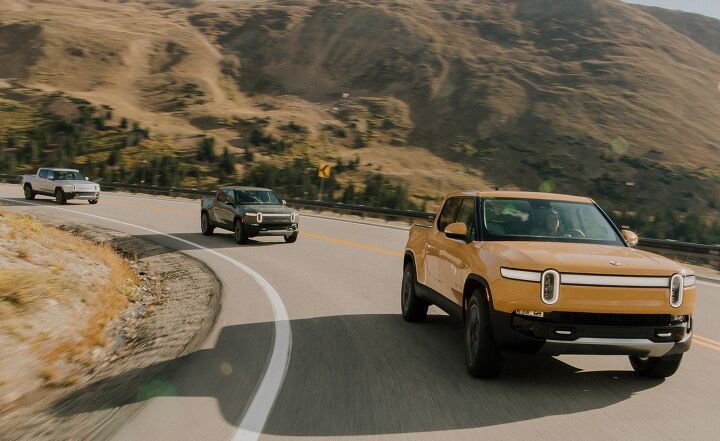Rivian Founder R.J. Scaringe Discusses Software, Partnerships, Trump

PLYMOUTH, Mich. – Rivian is known for its outdoorsy, tech-forward trucks and SUVs. They’re subtle and all-electric.
Quiet luxury on four wheels. But Rivian founder and CEO R.J. Scaringe has a vision for his company that transcends growth measured in sales volume and new products. No, Scaringe wants Rivian’s software to power the car industry.
OK, maybe not every car. Even today, not everything needs “software defined architecture,” which powers things like infotainment, safety systems, autonomy and many other features. As those features become more advanced and more widely used, Scaringe is open to partnering with other companies, trading his proprietary technology for capital infusions.
There may come a day when software is the centerpiece of Rivian’s business, and building its own vehicles are almost a side project. Case in point: The tie-up with Volkswagen is worth $5.8 billion and VW is now Rivian’s second largest shareholder behind only Amazon, which is another key Rivian partner.
“We hope both of those demonstrate our ability to work with large-scale companies,” Scaringe said, speaking at an Automotive Press Association event at Rivian’s engineering facilities in Plymouth, Mich., about 30 miles west of downtown Detroit.
VW will use Rivian’s software to power the ID.1, an attractive small electric car set to be sold in Europe and a more expensive flagship model, illustrating the breadth of the partnership.
“It proves that Rivian is capable of working with a large-scale OEM,” Scaringe said.
To support this software push, Rivian recently moved its headquarters from its Michigan engineering base to Silicon Valley, though it still has 1,000 engineers in Plymouth. By 2035, Scaringe thinks most vehicles will need a software-defined architecture and estimates it costs $3,000 to $4,000 per vehicle for a supplier to do it.
In his view, a company like Rivian can license the software, saving other automakers time and money from developing their own supply chain or doing the development work in-house.
Clearly, the market has responded to Scaringe’s approach, and Rivian’s stock price has grown 29 percent in the last year, though it was still trading around a modest $13 a share in mid-October, a similar price to Ford Motor Co. By contrast, Tesla, the company with which Rivian is often compared, has seen its stock grow 97 percent to about $437 a share. Another EV maker, Lucid, sees its shares trade for about $21.50, though they have fallen 34 percent in the last year.
All of this comes as the electric car market undergoes a major transition. The Trump administration ended the $7,500 federal tax credit in September, sparking demand but now setting up the EV market for a cool-off period. Tariffs have also roiled the economy as automakers consider production and price shifts in response to the federal levies. Still, Scaringe said Rivian is positioned to be competitive on more than just price, offering a unique product in the EV market.
“I’ve never been more confident in the company than I am today,” Scaringe said.
Scaringe said he expects his vehicles to be crosshopped with gas-powered cars and hybrids and noted more than three-quarters of Rivian customers have never owned an EV. His remarks came at a transitional time for his company, which is launching the smaller and more affordable R2 crossover in the first part of next year at its Normal, Ill., factory. Rivian decided to expand the factory rather than make the R2 in Georgia, though Scaringe said the southern site is still expected to start making vehicles in 2028. “It’s still a core part of our strategy,” he said.
Rivian clearly wants to highlight its investment in the United States, and Scaringe said the company has a good relationship with the Trump administration, though he has not met the president.
“I think the current administration is very pro-business, pro-technology,” Scaringe said. “We’re actually quite aligned with the administration.”
Still, he admitted the tariffs are always top of mind. “I have a lot of friends who run car companies, and conversations used to start with weather and sports. Now they start with tariffs.”
He also addressed another thorny matter – buttons – or the lack thereof in his Rivians.
“We’re not planning to have a lot of traditional buttons,” Scaringe said. “We’re making it [this way] because it’s the best experience.”
This confidence underpins his belief in Rivian, a venture he founded the day after he finished his doctorate and has led ever since. “If a car is compelling, I think it will sell,” Scaringe said. ”I think there’s going to be a handful of compelling options, including Rivian.
Become an AutoGuide insider. Get the latest from the automotive world first by subscribing to our newsletter here.

Greg Migliore is AutoGuide's Editorial Director. He has covered the auto industry for two decades, most recently as editor-in-chief of Autoblog. He's also been an editor at Automobile and Autoweek. He's a graduate of Eastern Michigan University, Michigan State University and the Yale Publishing course. Greg is a member of the North American Car, Truck and Utility Vehicle of the Year Awards jury.
More by Greg Migliore




































Comments
Join the conversation